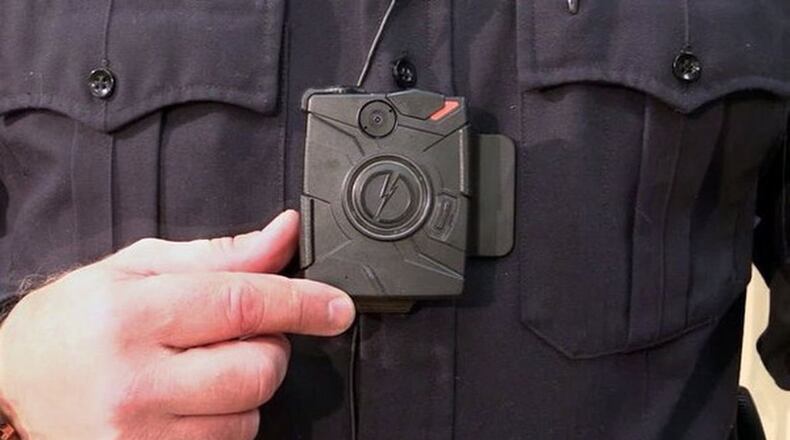“I am open to exploring body cameras for Dayton police,” said Dayton Mayor Nan Whaley. “I’m hopeful we’ll be able to move forward with this transparency tool.”
But some groups and researchers say cameras don’t necessarily change how police behave and interact with the public, and policies on their use tend to be very important.
MORE: Local jail on ‘code red’ after inmate contracts coronavirus
Earlier this month, Whaley released a five-part plan aimed at improving community-police relations amid growing calls for police reforms and after multiple protests in the city.
After her announcement, the Dayton Fraternal Order of Police Lodge No. 44 issued a statement saying it supports the plan and welcomes using body-worn cameras to increase transparency.
The Dayton FOP always has been in support of any and all technology that will aid the department and its officers with transparency and building a stronger community partnership, said Jerry Dix, the local union president.
Body cameras are another “fact-gathering” tool that the union supports, but the community has to be educated about its limitations because it is not a “catch-all answer,” he said.
Of Ohio’s largest six cities, Dayton is the only one that has yet to provide officers with video cameras.
Even police in some small Ohio cities, as well as sheriffs’ deputies and campus police officers, wear mobile video recording equipment in the normal course of their duties.
CORONAVIRUS: Complete Coverage by the Dayton Daily News
By 2016, nearly half of general-purpose U.S. law enforcement agencies had acquired body-worn cameras, according to data from the Bureau of Justice Statistics, and adoption of the technology continues to grow.
Overwhelmingly, police agencies say they purchased the technology to improve officer safety, provide more evidence in cases and reduce civilian complaints and agency liability, the bureau's survey found.
Dayton police officials and elected leaders have talked about deploying the technology for years.
Almost two-thirds of respondents said they feel safer when police officers wear video cameras. About three in four respondents said body cameras would increase trust between the police department and the community it serves.
The vast majority of respondents said they believed body cameras would reduce the likelihood of confrontations, improve police officers’ behaviors, protect police against false accusations and help resolve complaints.
But the police department never acquired camera equipment.
Police officials this week said the department tried to get grant funding for body cameras, but that did not work out.
Officials have long said the cost of the equipment and related video storage system is one of the main issues.
The department also was concerned about data storage and the considerable amount of work needed to review and redact large amounts of information.
Police also say they were concerned about privacy and recording crime victims and witnesses, especially inside their homes and elsewhere where they might not expect such intrusion.
“When the department initially looked at this technology, it was relatively new, and due to the increase in equipment, storage, and labor costs, the decision was made to continue to invest in in-car cameras,” the police department said.
MORE: Arrested Dayton employee: Police used ‘brute’ force during protests
The police department says it regularly evaluates new studies about body-worn cameras and innovations in the equipment.
The department said some recent tech upgrades means it could be less-labor intensive to store data and redact information.
Whaley said the the city looked into body cameras in the past, but determined the long-term data storage costs to be too high.
But she said she’s had some talks with state officials about possible ways to help cover the cost of the technology.
There’s also an ongoing debate about whether body cameras actually change behaviors and lead to better interactions.
Organizations like the ACLU of Ohio originally hoped that body cameras would provide an extra level of transparency that could help deter unwarranted and unconstitutional police behavior since officers knew they were being recorded, said Gary Daniels, chief lobbyist, with the ACLU of Ohio.
But Daniels said it’s not clear that body cameras actually benefit the larger community, even though many in law enforcement over time have warmed to the technology, believing video evidence would result in fewer bogus complaints of unnecessary force and could confirm their versions of events.
MORE: Dayton mayor vows police changes; some black leaders skeptical
Recent protests in Ohio and around the country revealed that body cameras and citizens filming police on their mobile devices have not solved legitimate and widespread concerns about police behavior, he said.
Police have responded to protests in “unacceptable and unconstitutional ways that were caught on video and yet most officers were not held accountable,” he said.
“So, while body cameras may and do prove helpful in at least some individual situations, they are not leading to larger, structural changes, or an overall increase in accountability, or even a reduction of these terrible incidents,” Daniels said.
The big take-away from research on body-worn cameras is that their effectiveness depends on context and specific implementation, said Andrea Headley, an assistant professor at the John Glenn College of Public Affairs at the Ohio State University.
Different jurisdictions that use body-worn cameras see different levels of impact on officer performance outcomes, based on policies such as whether they must be activated or if it is left to the discretion of officers, she said.
Other factors include public access to video footage in a timely manner, data storage and standards for checking footage regularly and randomly, she said.
Headley is a co-author on a study that has been accepted for publication that found that Washington, D.C., residents believed that body-worn cameras could impact officer behavior but would not result in greater community trust of police.
About the Author

